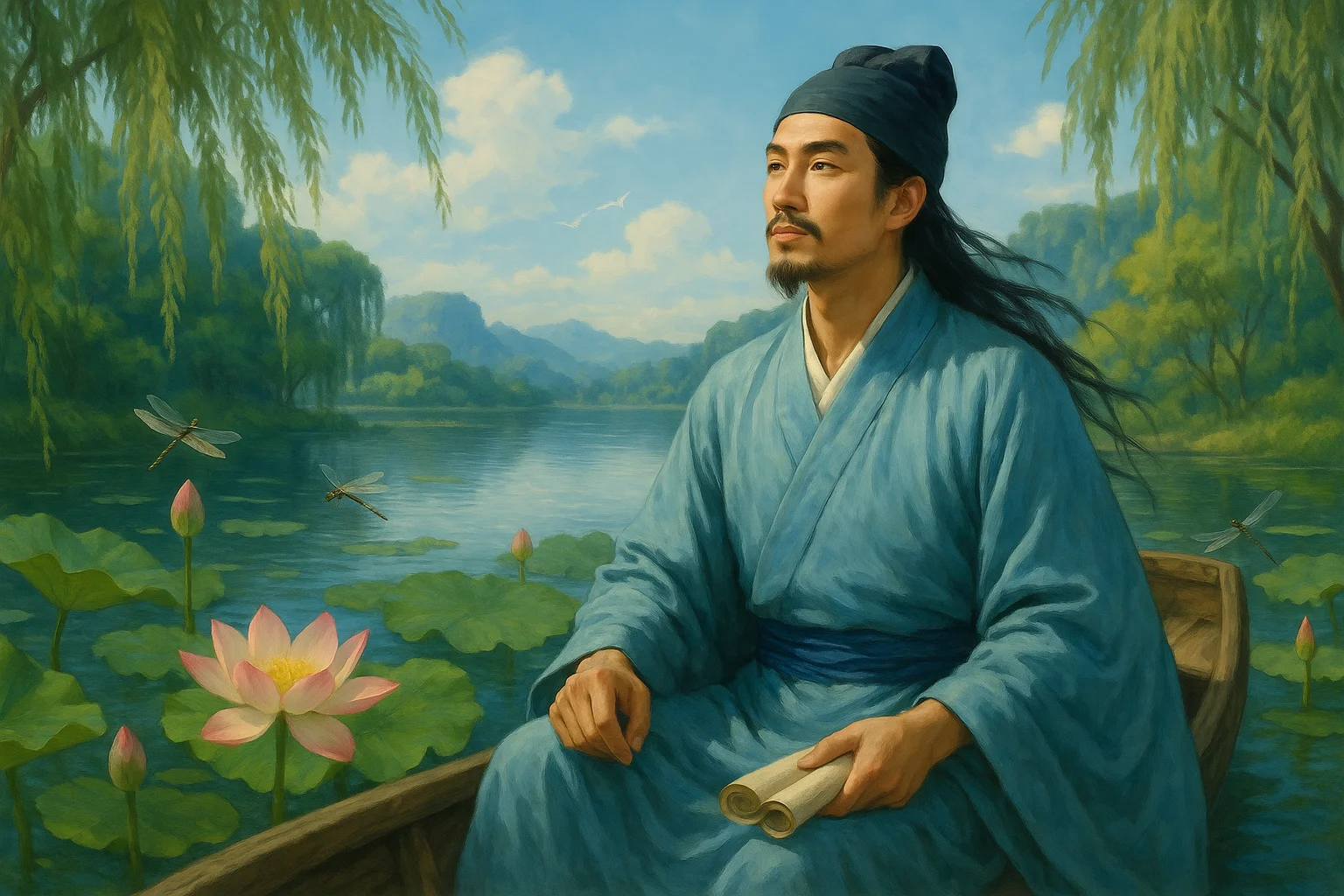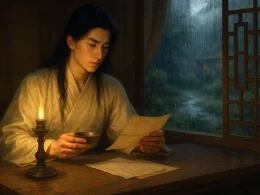Plums leave tartness that softens the teeth,
Banana leaves lend green to window-sheath.
Waking from long noon sleep—thoughts adrift and bare,
I watch children catch willow-down in the air.
Original Poem
「闲居初夏午睡起 · 其一」
杨万里
梅子留酸软齿牙,芭蕉分绿与窗纱。
日长睡起无情思,闲看儿童捉柳花。
Interpretation
Composed during the Qiandao era of Emperor Xiaozong of Southern Song, this work dates from Yang Wanli's period of retirement after resigning from official duties. Residing in his countryside home, he frequently incorporated pastoral scenes into his poetry to express his return to simplicity and leisurely state of mind. This particular poem captures the observations and sensations upon waking from a midday nap in early summer. Written with a tranquil and understated tone, it records an extremely subtle yet profoundly poetic moment from daily life, revealing the poet's deep connection with nature and affectionate embrace of ordinary existence.
First Couplet: "梅子留酸软齿牙,芭蕉分绿与窗纱。"
Méizǐ liú suān ruǎn chǐyá, bājiāo fēn lǜ yǔ chuāngshā.
The plums leave their tartness, softening one's teeth; banana leaves share their green with the window screen.
The poet chooses plums and banana plants to capture early summer's essence: the matured plums impart an unforgettable tartness, while the broad, dark green leaves of the banana plant diffuse their verdant hue through the window screen into the room. This depicts both taste and vision, serving as a portrait of the changing seasons and establishing a vivid, distinct基调 (jīdiào, tonal foundation) for the summer atmosphere.
Second Couplet: "日长睡起无情思,闲看儿童捉柳花。"
Rì cháng shuì qǐ wú qíngsī, xián kàn értóng zhuō liǔhuā.
Long summer days, waking from sleep without a thought; idly watching children catch the willow catkins.
This couplet seamlessly merges the poet's internal state with the external scene. "Without a thought" (无情思 wú qíngsī) conveys the languor post-nap; "idly watching children" (闲看儿童 xián kàn értóng) reveals a carefree惬意 (qièyì, delight). The image of children chasing willow catkins is lively and lighthearted, reflecting the poet's leisurely心境 (xīnjìng, state of mind) and imbuing the entire poem with vitality and童趣 (tóngqù, childlike charm).
The poem, through imagery like plums, banana plants, and willow catkins, presents the unique aura of early summer, expressing a leisurely mood through plain and natural language. The poet combines his slight post-nap sensations with the innocent play of children, demonstrating both a慵懒安逸 (yōnlǎn ānyì, languid and comfortable) lifestyle and an appreciation for childlike fun and a joyful spirit.
Holistic Appreciation
This poem depicts not a spectacular scene but an extremely ordinary moment of life: early summer, tart plums, verdant banana leaves; waking from an afternoon nap listless, only to idly watch children chasing blossoms. Its subtlety lies in the poet's use of simple, unadorned language to capture the everyday, as if "effortlessly plucking poetry from the air."
With his keen powers of observation, Yang Wanli interweaves taste, vision, implied scent, and state of mind, making one feel as if present: tartness lingering between the teeth, greenness blooming before the eyes, willow catkins dancing outside the window, and the sound of children's joyful laughter reaching the ears. Reading it brings not only the fresh breath of early summer but also a sense of共鸣 (gòngmíng, resonance) that transcends time.
Artistic Merits
- Rooted in the everyday: Drawing from extremely common minor events in daily life, embodying the characteristic of Yang Wanli's poetry that "verse springs from life."
- Intertwining of senses: The tart taste of plums, the visual green of banana leaves, the dynamic flight of willow catkins, combined with a languid state of mind, create a multi-dimensional意境 (yìjìng, artistic conception).
- Accented with childlike charm: The image of children chasing willow catkins injects vitality into the poem, ensuring the leisurely tone feels lively and充满情趣 (chōngmǎn qíngqù, full of charm) rather than stagnant.
- Simple and plain language: Unadorned and natural in diction, yet distinctive in its beauty due to refined word choice.
Insights
This poem reveals that poetry does not reside solely in magnificent landscapes or major life events; mundane details of everyday life can also become triggers for the poetic heart. If one can attentively observe the surrounding scenery and maintain a childlike heart, one can discover infinite poetic charm and joy within seemingly ordinary days.
About the Poet

Yang Wanli (杨万里 1127 - 1206), a native of Jishui in Jiangxi, was a renowned poet of the Southern Song Dynasty, celebrated as one of the "Four Great Masters of the Restoration" alongside Lu You, Fan Chengda, and You Mao. He attained the jinshi degree in 1154 and rose to the position of Academician of the Baomo Pavilion. Breaking free from the constraints of the Jiangxi School of Poetry, he pioneered the lively and natural "Chengzhai Style," advocating for learning from nature and employing plain yet profound language. His poetry, often drawing inspiration from everyday life, profoundly influenced later schools of lyrical expression, particularly the Xingling (Spirit and Sensibility) School.












